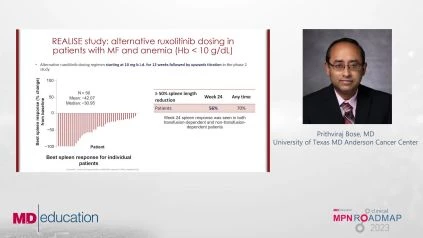Prithvi Bose, an associate professor in the Department of Leukemia at MD Anderson Cancer Center in Houston, Texas, focuses on Myeloproliferative neoplasms and specifically addresses the management of anemia in myelofibrosis. Anemia is a common and significant clinical presentation that poses a burden on both patients and the healthcare system. Approximately one-third of myelofibrosis patients present with anemia, and eventually, all patients develop anemia. Anemia has been recognized as an unfavorable prognostic factor and is included in various prognostic models for myelofibrosis. The severity of anemia impacts survival, and transfusion requirements also affect prognosis. Current approaches to managing anemia in myelofibrosis involve using existing drugs from other diseases since there are no approved agents specifically for myelofibrosis-associated anemia. Erythropoietin and its analogs are used when endogenous erythropoietin levels are low, while drugs like danazol, an androgen, are helpful when endogenous erythropoietin levels are high. IMiD drugs such as lenalidomide, pomalidomide, and thalidomide have been moderately effective. However, none of these therapies provide significant results. Luspatercept, a TGF-beta superfamily ligand trap, is being studied in a pivotal phase three trial for anemia in myelofibrosis. Preliminary results from phase two trials suggest that luspatercept shows promise in transfusion-dependent myelofibrosis patients, especially those receiving ruxolitinib. Another strategy to address anemia is modifying the dosing of ruxolitinib in anemic patients, which has shown feasible and effective results. Ruxolitinib and the newer JAK inhibitor, ruxolitinib, have similar rates of anemia and thrombocytopenia side effects. Momelotinib, a JAK1/2 and ACVR1 inhibitor, aims to address anemia, spleen, and symptom benefits with a single drug. Simplify One study results indicate that momelotinib can maintain dose intensity while improving anemia. The study also shows a higher rate of transfusion independence with momelotinib compared to ruxolitinib at week 24. These findings have led to a phase three pivotal trial comparing luspatercept to placebo in myelofibrosis patients on a stable dose of ruxolitinib and requiring red blood cell transfusions. Momelotinib offers a promising approach by targeting multiple aspects of myelofibrosis and maintaining dose intensity.
More videos related to this subject:
PTG-300: ASH 2022 Srdan Verstovsek Verify Phase 3 Clinical Trial

